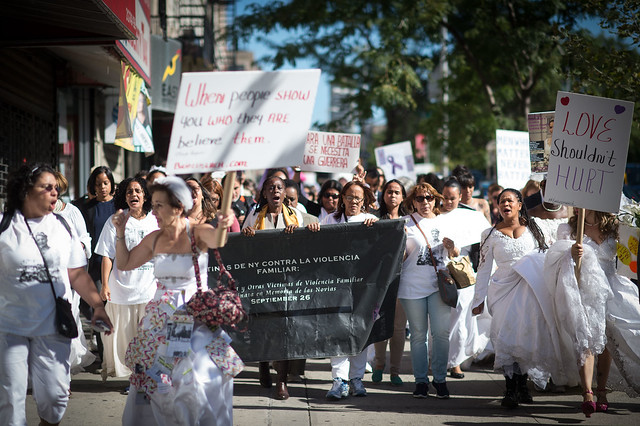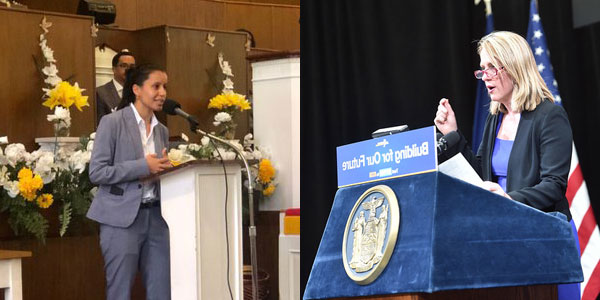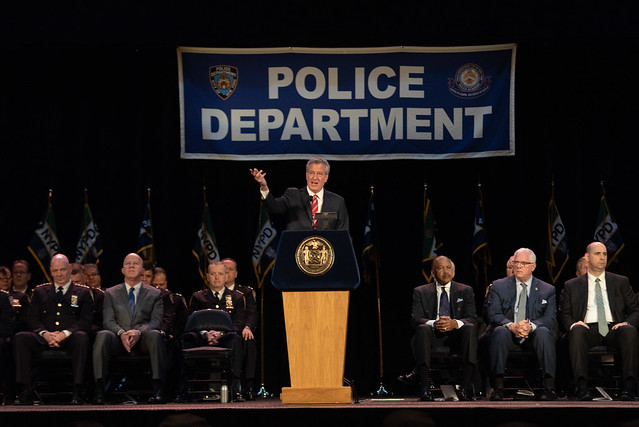Council Takes Stock of City's Efforts to Help Victims of Domestic Violence

Annual Gladys Ricard and Victims of Domestic Violence Memorial Walk/Brides' March (2016) (photo: Michael Appleton/Mayor's Office)
The City Council held an oversight hearing Monday to discuss an annual report on domestic violence in New York City, including city initiatives to help victims. The hearing featured testimony from Cecile Noel, commissioner of the Mayor’s Office to End Domestic and Gender-Based Violence (ENDGBV), and advocacy groups.
“As more survivors come forward to report abuse we must make sure the city is capturing the demand for services,” said City Council Member Helen Rosenthal, chair of the Council’s Committee on Women and Gender Equity, at the hearing. Indicators continue to show that reports of domestic violence are on the rise in the city, though it’s unclear if that is more a result of victims reporting the abuse than more incidents actually taking place.
ENDGBV was re-launched in 2018 by Mayor Bill de Blasio to develop policies, organize training, and operate the New York City Family Justice Centers, among other responsibilities. With one located in each borough, Family Justice Centers connect survivors of domestic and gender-based violence with organizations that provide case management, economic empowerment, counseling, civil legal, and criminal legal assistance. Many of these services are located within the Family Justice Center, so survivors only need to go to one location.
In 2018, 25,222 different clients visited a Family Justice Center, according to ENDGVB statistics, and made a total of over 65,000 visits to the centers.
The new report - the first of its kind mandated by a recent city law - and the Council hearing, come at a time of higher reporting of domestic violence in the city. While the “Me Too Movement” and associated cultural awareness has brought more attention over the last few years to domestic violence and sexual assault, after spiking, NYPD “radio runs” responding to alleged or suspected domestic violence decreased slightly last year.
Police officers responded to 241,584 domestic violence calls in 2018, down from 245,577 in 2017, according to an NYPD spokesperson. Police officers received 287,549 domestic violence incident reports in 2017, a number that dropped by about 5,000 in 2018, according to the spokesperson. More domestic violence incident reports were received by the NYPD in 2017 than in any year since 2014.
However, the number of felony assault complaints related to domestic violence increased from 7,800 in 2017 to 8,200 in 2018, according to data from the NYPD’s website.
A dozen years ago, in 2007, 4.8 percent of all major crimes in the city were related to domestic violence. In 2016, domestic violence constituted 11.6 percent -- a function of both most other major crimes continuing to drop and reporting of domestic violence increasing.
Domestic violence was a factor in 17.5 percent of homicides and 20 percent of assaults in the city in 2017, according to ENDGVB’s annual report. The number of homicides related to domestic violence increased from 51 in 2017 to 54 in 2018, according to NYPD statistics. There were just under 300 total murders in the city in each of those years, meaning roughly one in six murders in the city are related to domestic violence.
Vulnerable New Yorkers are disproportionately affected by domestic violence, especially low-income New Yorkers and people of color, Council Member Rosenthal pointed out at the hearing.
While Family Justice Centers provide integral services to often underserved communities, they are still in need of improvements, said Rosenthal, a Manhattan Democrat. Rosenthal highlighted the significant number of New Yorkers that speak a language other than English, and the challenges posed to them by using a contracted interpretation service to communicate at Family Justice Centers.
To communicate with clients who do not speak English, Family Justice Centers employ Voiance, a telephonic interpretation contractor. Rosenthal pressed Noel on the sensitivity of the subject requiring interpretation, suggesting that interpreters should receive training on how to discuss trauma with survivors.
“Given the inherently sensitive nature of this work and what we’ve learned about the implications for people who are not trained for survivors, it would be of the interest of the committee and the counsel to find out how that’s working out,” Rosenthal said at the hearing. “Perhaps there should be more preventative training for these workers,” she said.
“To every degree possible we make sure the contractor understands both the Family Justice Center and our issues,” Noel said. “We don’t provide direct training to Voiance but if issues come up that present any problem to the contractor those are immediately addressed.”
The language barrier has not gotten in the way of the Family Justice Centers doing the work, Noel said. Every one of the unique clients who visited a Family Justice Center in 2018 filled out a client intake form, the first step in receiving services.
Rosenthal encouraged the Family Justice Centers to bolster their economic empowerment initiatives. ENDGVB operates a learning lab at the Manhattan Family Justice Center, increasing the capacity of ENDGVB’s existing four-month career training program by 50 percent. Learning labs do not exist at Family Justice Centers in any other borough.
“We are aware of no public investments specifically allocated to workforce programming for gender-based violence survivors,” said Sarah Hayes, Deputy Director of Economic Empowerment Program at Sanctuary for Families, a group providing services for survivors of domestic and gender-based violence.
While the Family Justice Centers track their visitors and the services they use, they do not track from where the clients are referred.
“A tracking mechanism is essential because it will tell us where the bulk of our constituents are coming from and will allow us to better engage with them,” Council Member Diana Ayala said at the hearing.
De Blasio has taken several steps to address domestic violence as incident reports have grown, introducing in 2017 the Domestic Violence Task Force, which invested nearly $11 million in programs to enhance legal protections for survivors of domestic violence and improve education on the issue, according to a press release from that year.
“This report sends a loud and clear message – we will not tolerate domestic violence, survivors have the City’s full support, and abusers must be held accountable. We will do everything we can to ensure that New York City is safer for everyone, everywhere, at all times,” de Blasio said in a May 2017 press release announcing the results of the task force’s report. As the city saw increased domestic violence reporting, de Blasio and other city officials were pushed to take action.
In 2018, de Blasio signed bills to combat workplace sexual harassment, expand the city’s paid leave laws to employees who are survivors of domestic violence, and enacted ENDGBV by executive order, mandating the city to address and coordinate a response to domestic violence.
First Lady Chirlane McCray has taken a primary role in the city’s efforts to combat domestic violence, announcing in 2018 Interrupting Violence At Home, a citywide program to address domestic violence through services, training, and intervention for abusive partners who are not involved in the criminal justice system.
“Any kind of violence is unacceptable. But as we keep survivors and families safe, we must also do everything we can to intervene directly with their abusive partners,” McCray said in a 2018 press release announcing the initiative. “Hurt people hurt people.”
The Council committee also discussed on Monday a resolution to encourage the federal passage of the Violence Against Women Reauthorization Act of 2019. The Violence Against Women Act was first passed under President Bill Clinton in 1994, but must be renewed by Congress. The bill has been renewed in every subsequent administration and was last renewed in 2013.
The bill passed in the House of Representatives in April, but has stalled in the Republican-controlled Senate. Opposition to the bill has focused on a provision, known as the “boyfriend loophole,” that would make it easier for law enforcement to strip perpetrators of domestic violence of their guns.
***
by Noah Berman, Gotham Gazette
@GothamGazette
Max & Murphy Podcast: Analyzing Queens District Attorney Primary Results

l-r: Tiffany Cabán (photo: @CabanForQueens); Melinda Katz (photo: Kevin P. Coughlin/Governor's Office)
June 26, 2019 - Max & Murphy Podcast: Analyzing the Queens District Attorney Primary Results
 The hosts discussed the apparent outcome of the Queens District Attorney primary, where public defender Tiffany Cabán appears to have beaten the rest of the field, including Queens Borough President Melinda Katz.
The hosts discussed the apparent outcome of the Queens District Attorney primary, where public defender Tiffany Cabán appears to have beaten the rest of the field, including Queens Borough President Melinda Katz.
Listen to the conversation and let us know what you think -- we're on Twitter @TweetBenMax and @JarrettMurphy. You can listen to the show through the embedded audio below or download the episode wherever you get your podcasts, under "Max & Murphy," and listen to Max & Murphy live on Wednesdays at 5 p.m. on WBAI radio, 99.5FM or wbai.org
***
by Ben Max, Gotham Gazette
@tweetBenMax @GothamGazette
De Blasio Reps Sought to Kill Police Accountability Measure

(photo: Michael Appleton/Mayor's Office)
Less than a week after arguments ended in the high-profile NYPD administrative trial of Officer Daniel Pantaleo, the administration of Mayor de Blasio waged an effort to block a significant reform aimed at preventing and punishing lying by police officers during investigations of misconduct.
One commissioner on the 2019 New York City Charter Revision Commission says members were contacted by a representative of the mayor in advance of a vote earlier this month on whether to move to the November election ballot a slate of proposals to modify the city charter, while the police department carried out a parallel campaign to sway commissioners, who are supposed to be independent of the elected officials who appoint them.
A spokesperson for de Blasio did not deny the effort, telling Gotham Gazette that the administration talks through all the issues with charter commissioners, including sharing concerns from city agencies.
The 15 commissioners on the 2019 commission, tasked with reviewing the city’s central governing laws and presenting proposed changes to voters, were appointed by the mayor, City Council, comptroller, public advocate, and borough presidents. After months of hearings and meetings, the commission recently met twice to vote on which proposals to advance to the ballot, selecting 20 in total.
One of the 20 proved especially controversial. It was the only one that was voted down during the first of the two recent meetings, but was then passed upon reevaluation at the second. It deals with strengthening the power of the Civilian Complaint Review Board (CCRB) to prosecute discipline charges when police officers lie during the course of investigations.
According to four charter revision commissioners Gotham Gazette spoke with, in the conversations ahead of the first meeting on June 12, administration and police representatives urged the commissioners to vote down the measure, “proposal 7,” which accountability advocates believe would significantly curtail officers’ ability to avoid scrutiny and discipline.
In public, however, the administration has maintained silence on the proposal to rein in police lying -- a practice that has been exposed in significant new detail in recent months by reporting by Gothamist and elsewhere -- and a spokesperson for the mayor told Gotham Gazette it is still in the process of official review.
The events shine a light on the mayor’s oft-criticized level of commitment to transparency and accountability with regard to police misconduct and efforts to reform the politically powerful police department.
Commissioner Sal Albanese, who twice voted against the charter proposal, told Gotham Gazette he was contacted by a representative of the de Blasio administration who told him the current apparatus to deal with false official statements is working well.
“The de Blasio administration made a very compelling case that the present system works. If an officer is accused or makes a false statement that they handle it, and if it’s serious it goes to the prosecutors. That was their position and it makes sense,” Albanese said, referring to the NYPD’s process of handling allegations of police lying internally. Albanese, a former City Council member and mayoral candidate, was appointed to the commission by Brooklyn Borough President Eric Adams, himself a former NYPD officer and captain.
Probed further about contact from the de Blasio administration, Albanese said, “That’s their position. That’s the call I got from them, yeah.”
But in an email to Gotham Gazette Friday, Will Baskin-Gerwitz, a spokesperson for the mayor, wrote: “Mayor de Blasio has heard the informed opinions of CCRB and NYPD about the proposal, and he continues to review it in advance of the revision commission’s final vote in July.”
Albanese and six other commissioners, including all four appointed by de Blasio and the commissioner appointed by Staten Island Borough President James Oddo, originally voted against proposal 7 on June 12 at the first meeting where the commission took up potential charter amendments. The measure was the only one of the 18 considered by the 15-member body that was not passed that night.
Asked to comment on the mayoral appointees’ voting pattern at the June 12 vote, Commissioner Sateesh Nori, an appointee of former Public Advocate Letitia James, told Gotham Gazette, “I don’t know what happened exactly in their minds, and whether they voted individually or as a collective group, whether they represented anybody.”
“But they’re all respectable, straightforward people and I think hopefully they’ll change their minds, or enough of them will,” he said, referring to the possibility of revisiting the vote.
“I think that’s the only life and death issue that we’re dealing with here,” Nori said. “It’s deeply disappointing.”
In an unusual display of political metanoia, after speaking with representatives of the CCRB and hearing from police reformers including the mothers of men killed by police, charter revision commissioners moved to revisit proposal 7 at the June 18 hearing, and voted it ahead toward the ballot in November.
One mayoral appointee, Commissioner Carl Weisbrod, changed his vote to support the controversial measure. The other three affirmed commitments to police transparency and honesty but did not support codifying the measure to bring police lying under independent scrutiny.
The purpose of the June votes was to advance proposals from the commission staff to the commission’s final report, which members need to approve at the end of July before amendments can be placed on the ballot in November.
‘The only life and death issue’
False statements made by the police in the course of misconduct investigations are well-documented and have figured into some of the most serious cases of police brutality and corruption, including the trial of Daniel Pantaleo in the 2014 death of Eric Garner.
A number of versight entities have been created to address police misconduct, corruption, and mismanagement, each with a relatively narrow mandate to pursue aspects of departmental impropriety. Several of the reforms being weighed by the 2019 Charter Revision Commission, including the one that has apparently attracted the opposition of the administration, have to do with giving more teeth to the Civilian Complaint Review Board, which is appointed by the mayor from a pool designated by the mayor, City Council, and police commissioner.
The CCRB is the principal entity charged with investigating civilian allegations of police misconduct when they fall into one of four categories, known as FADO: use of force, abuse of authority, discourtesy, and offensive language.
Currently, false testimony by the police to investigators falls outside the FADO categories, and as such cannot be the subject of investigations and disciplinary recommendations by the CCRB, which is an independent agency with the power to prosecute cases in administrative settings. Instead they must be referred to the police department to be dealt with internally, where allegations of lying are often downgraded or dismissed without repercussion.
A report in the New York Times last year found that of the 81 tracked cases of false statements referred to the police department by the CCRB since 2010 only two were affirmed by the NYPD’s Internal Affairs Bureau. A “Blue Ribbon” panel appointed by NYPD Commissioner James O’Neill to recommend reforms to the department’s internal disciplinary system, in its final report in January, discussed a pervasive culture of “lax” or nonexistent responses to officers who lie to investigators about their and their colleagues’ actions.
In an email to Gotham Gazette, Sergeant Jessica McRorie, a spokesperson for the NYPD, said the department has “accepted all of the recommendations of the independent Blue Ribbon Panel on discipline.” McRorie made a distinction between “intentional or willfully false statements” -- which would immediately result in an investigation and potential disciplinary action -- and “unintentional inconsistent statements which are generally the result of insufficient preparation for testimony, in which case enhanced one-on-one training may be appropriate.”
The distinction did not resonate with some of the charter revision commissioners.
“I have to say that the argument that we should be giving the benefit of the doubt to police officers who cannot remember what they did in a situation of likely police misconduct and even violence,” in contrast with the treatment of people of color by police nationwide, “was infuriating to me,” Commissioner Alison Hirsh told Gotham Gazette. Hirsh, the political director at the powerful building services workers union, 32BJ SEIU, was appointed to the commission by Comptroller Scott Stringer.
To enhance the CCRB’s ability to check the powers of the police, many stakeholders have pushed for the expansion of FADO to include other types of misconduct like lying to investigators. The charter revision commission, which has the power to examine the entire City Charter and put amendments directly to voters via referendum, has attracted advocates eager to see reform to the NYPD, a less-than-transparent city department backed by influential political forces with a great deal of sway at City Hall.
Several of the commissioners, who saw the June 12 commission vote as an opportunity to advance police reforms, were surprised at proposal 7’s lone failure that night.
“Some of us left that meeting last week with our jaws dropped. Like, what happened, how did that happen?” Nori said. “We thought it was a close vote but we didn’t think it would be unsuccessful, and that was a huge shock.”
Several other commissioners who spoke with Gotham Gazette expressed the same sense of bewilderment.
That night, seven commissioners voted against proposal 7, including all four de Blasio appointees, as well as the commissioners appointed by borough presidents from the Bronx, Brooklyn, and Staten Island. The commissioners chosen by the public advocate, comptroller, and Manhattan borough president, and two of the commissioners appointed by the City Council voted in favor. The remaining two City Council appointees abstained from voting, and the Queens Borough President’s appointee was absent because of a family emergency.
Four other proposals relating to the CCRB were voted ahead on June 12. If passed by voters in November, they will give other entities besides the mayor the authority to appoint members to the board; give the CCRB executive director subpoena power; guarantee a minimum budget for the agency; and require the police commissioner to provide an explanation when deviating from a CCRB disciplinary recommendation.
Charter revision commissions have historically been empaneled by mayors, as was the one that put proposals on the ballot last November. The current commission, however, was created through the City Council on the initiative of Council Speaker Corey Johnson, Manhattan Borough President Gale Brewer, and then-Public Advocate Letitia James.
Its members were appointed by a mix of elected officials, with none appointing a majority: The mayor and City Council each chose four commissioners; the remaining seven were appointed by each borough president, the public advocate, and the city comptroller.
“It's important that no single official appoints a majority. Some previous charter reviews haven't been independent, instead dominated by appointees answering directly to mayors,” wrote Brewer and James in an op-ed announcing their plan.
Vote Revisited
Following the June 12 failure of proposal 7, a counter effort was waged among some of the commissioners sympathetic to the arguments of police reformers to revisit the “no” vote.
“The police have a tremendous amount of power in this city and they waged an effective campaign to influence people and change their minds,” Nori told Gotham Gazette before the second meeting, referring to commissioners.
“I hope we can try to change that today,” he said.
On June 18, when the commission met for a second time to discuss and vote on which proposals to send toward the ballot, Nori raised the issue again and asked if any of the opposing commissioners would reconsider their vote.
Weisbrod was the only commissioner appointed by the mayor to change his vote to support proposal 7 but, thanks to the affirmative votes of commissioners who had abstained or were absent at the first meeting, the proposal passed eight to six (with one abstention) at the second meeting.
One of four de Blasio appointees, Weisbrod, flipped his vote to support the enhanced oversight measure after thanking Nori and Hirsh for helping him “see the light on it for what it is,” after the previous meeting.
“I think we have an obligation to support the truth,” he said at the meeting.
The other mayoral appointees seemed to walk a fine line when they chose to explain their opposition in the face of reconsideration.
Commissioner Lisette Camilo, a de Blasio appointee and the head of the city’s Department of Citywide Administrative Services, said, “I really agree with the spirit of the reasons to put this motion forward and I supported the reconsideration. I will vote no. I do not believe that passing this will largely change anything. This is more of a symbolic action.”
Commissioner Paula Gavin, another mayoral appointee and former Chief Service Officer under the mayor, said, “I do believe in truth and honesty but I’m going to keep my vote as no because it has to do with structure.”
Commissioner Lindsay Greene, a de Blasio appointee and senior advisor in the mayor’s office, said, in the absence of more fundamental changes to the powers of the CCRB, “I don’t think this does enough, so it feels more form over substance. But I generally support any efforts we are trying to pursue, generally, for more police accountability. My vote is no.”
But the measure passed, and police reform and accountability activists celebrated.
“The false statements ballot item is important because it is the ONLY item on this November’s ballot that has any meaningful significance for police accountability,” wrote the Communities United for Police Reform coalition in a statement.
***
by Ethan Geringer-Sameth, reporter, Gotham Gazette
@GeringerSameth @GothamGazette




